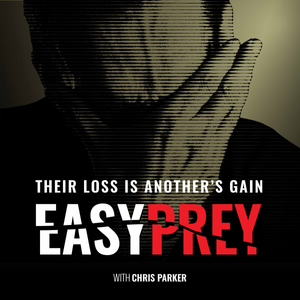
New and Improved Nigerian Scams with Ronnie Tokazowski
06/21/23 • 50 min
In this episode, we look at two sides of the Nigerian scam: The emotional, psychological, and financial damage done by scammers and the scammers we often look at as bad people doing bad things. But in some cultures, this is seen as an acceptable career option.
Today’s guest is Ronnie Tokazowski. Ronnie has been fighting Nigerian fraud for the last seven years and has collaborated with both law enforcement and the private sector. He runs a mailing list which collaborates with victims in identifying critical pieces of information around how the fraud works as well as working with romance victims themselves.
Show Notes:- [0:53] - Ronnie shares his role as a Principal Threat Advisor and the work he does with Nigerian fraud.
- [2:10] - Seven years ago, Ronnie saw the increasing trend in Nigerian fraud and is trying to get ahead of it.
- [3:58] - Scammers operate in a way that is similar to pulling tools out of a toolbox. They know which strategies to use in different situations.
- [5:44] - Relationships have been built with victims over months or sometimes even years, especially in romance scams.
- [8:19] - Ronnie explains how emotions are targeted to build relationships with scammers.
- [10:36] - Business email cybercrime was the number one cybercrime for seven years ago.
- [11:41] - The more we talk about it, the more victims come forward to talk about their own experience and overcome the social stigma.
- [12:36] - While not a scam victim, Ronnie explains a scenario in which he questioned his decisions.
- [15:27] - There are people out there doing the work in Nigeria in getting scammers to leave the career. But it is a huge undertaking.
- [17:50] - A common scam is to reach out on social media and try to get the target off the platform to talk.
- [19:18] - Some scammers are victims of human trafficking doing the work against their will.
- [20:36] - Right now with pig butchering, the belief is that the groups are organized crime groups in China.
- [22:01] - Ronnie shares the experience in speaking with law enforcement in Nigeria.
- [23:57] - The connections to different scams are very intricate and sophisticated.
- [26:21] - In one experiment, gift cards were purchased to give to scammers to track what they did with them.
- [29:26] - Scammers collaborate together to find “clients” and share their list of victims to facilitate other crimes.
- [30:50] - Ronnie shares the story of a scammer who collaborated with multiple people and wound up being involved in tons of different types of scams.
- [33:12] - In Nigeria, there are a lot of tribal religions in play.
- [34:31] - Many scammers in Nigeria will go through rituals in their attempt to manifest wealth.
- [37:07] - One of the main motivations for scammers is their experience in poverty.
- [41:02] - What about government intervention? How is the Nigerian government handling the situation?
- [42:21] - In some countries, the government is also tied up in the scamming.
- [45:20] - Two factor authentication is critical to security.
- [46:26] - For businesses, there should be a process to ensure money is wired correctly when necessary.
- [48:10] - Ronnie doesn’t recommend investing in crypto right now especially if it sounds too good to be true.
Thanks for joining us on Easy Prey. Be sure to subscribe to our podcast on iTunes and leave a nice review.
Links and Resources:In this episode, we look at two sides of the Nigerian scam: The emotional, psychological, and financial damage done by scammers and the scammers we often look at as bad people doing bad things. But in some cultures, this is seen as an acceptable career option.
Today’s guest is Ronnie Tokazowski. Ronnie has been fighting Nigerian fraud for the last seven years and has collaborated with both law enforcement and the private sector. He runs a mailing list which collaborates with victims in identifying critical pieces of information around how the fraud works as well as working with romance victims themselves.
Show Notes:- [0:53] - Ronnie shares his role as a Principal Threat Advisor and the work he does with Nigerian fraud.
- [2:10] - Seven years ago, Ronnie saw the increasing trend in Nigerian fraud and is trying to get ahead of it.
- [3:58] - Scammers operate in a way that is similar to pulling tools out of a toolbox. They know which strategies to use in different situations.
- [5:44] - Relationships have been built with victims over months or sometimes even years, especially in romance scams.
- [8:19] - Ronnie explains how emotions are targeted to build relationships with scammers.
- [10:36] - Business email cybercrime was the number one cybercrime for seven years ago.
- [11:41] - The more we talk about it, the more victims come forward to talk about their own experience and overcome the social stigma.
- [12:36] - While not a scam victim, Ronnie explains a scenario in which he questioned his decisions.
- [15:27] - There are people out there doing the work in Nigeria in getting scammers to leave the career. But it is a huge undertaking.
- [17:50] - A common scam is to reach out on social media and try to get the target off the platform to talk.
- [19:18] - Some scammers are victims of human trafficking doing the work against their will.
- [20:36] - Right now with pig butchering, the belief is that the groups are organized crime groups in China.
- [22:01] - Ronnie shares the experience in speaking with law enforcement in Nigeria.
- [23:57] - The connections to different scams are very intricate and sophisticated.
- [26:21] - In one experiment, gift cards were purchased to give to scammers to track what they did with them.
- [29:26] - Scammers collaborate together to find “clients” and share their list of victims to facilitate other crimes.
- [30:50] - Ronnie shares the story of a scammer who collaborated with multiple people and wound up being involved in tons of different types of scams.
- [33:12] - In Nigeria, there are a lot of tribal religions in play.
- [34:31] - Many scammers in Nigeria will go through rituals in their attempt to manifest wealth.
- [37:07] - One of the main motivations for scammers is their experience in poverty.
- [41:02] - What about government intervention? How is the Nigerian government handling the situation?
- [42:21] - In some countries, the government is also tied up in the scamming.
- [45:20] - Two factor authentication is critical to security.
- [46:26] - For businesses, there should be a process to ensure money is wired correctly when necessary.
- [48:10] - Ronnie doesn’t recommend investing in crypto right now especially if it sounds too good to be true.
Thanks for joining us on Easy Prey. Be sure to subscribe to our podcast on iTunes and leave a nice review.
Links and Resources:Previous Episode

10 Types of Identity Crimes with Eva Velasquez
Recovering from identity crimes can be daunting and take a toll on your entire life, not just financially and emotionally. Once someone gains access to one of your accounts, they can work to manipulate your friends and relatives as well.
Today’s guest is Eva Velasquez. Eva is the President and CEO of The Identity Theft Resource Center. She previously served as the Vice President of Operation for the San Diego Better Business Bureau and for 21 years at the San Diego District Attorney’s Office. She is an author, public speaker, and a recognized expert who has been featured on CBS Mornings, NBC Nightly News, New York Times, NPR, and numerous other media outlets.
Show Notes:- [1:02] - Eva describes her role as CEO and President of The Identity Theft Resource Center and what the organization does.
- [2:11] - Eva began her career in law enforcement and learned firsthand how dismissive we are of victims of identity crimes.
- [4:26] - The great majority of these crimes go completely uninvestigated.
- [5:48] - Your energy is best spent on recovering what you’ve lost rather than trying to convict the perpetrator.
- [8:03] - Identity theft isn’t the only identity crime.
- [9:47] - Most scams and data breaches at this time can be considered an identity crime.
- [11:06] - The majority of identity crimes that are reported at The Identity Theft Resource Center are caused by social engineering.
- [13:42] - If you see some unusual activity or communication on social media from someone you know, let the real person know.
- [16:17] - Chris shares a strategy for family passwords to verify their identity.
- [18:11] - There are several different types of identity fraud. A lot of it is credit cards, but it could be other types of loans or accounts.
- [19:54] - Identity fraud is complicated to solve.
- [21:00] - Eva shares the story of a victim who was car jacked and has had non-stop identity theft issues.
- [22:24] - People who are victims of identity theft may even have major problems in getting jobs.
- [23:42] - The number of victims who have felt suicidal after identity theft has increased year over year.
- [25:37] - The Identity Theft Resource Center is like AAA roadside assistance. Reach out to them.
- [28:00] - Eva shares that this is her life’s mission. She would love a world where The Identity Theft Resource Center wasn’t needed.
- [29:22] - Password management needs to be improved.
- [31:03] - Multi-factor authorization is absolutely necessary.
- [33:28] - If you ever get a call from someone claiming to be from your bank, hang up and actually contact your bank using the number on your card.
- [34:42] - We need to flip our view of “annoying” security measures.
- [41:57] - Safeguard access to all the accounts you have, even email accounts.
- [43:16] - It can take anywhere between a day and ten years to resolve identity fraud. It is very situational.
- [46:03] - It may also be possible for something to appear solved but then it is in remission.
- [47:20] - There is no shame in asking for help. It is very complicated.
Thanks for joining us on Easy Prey. Be sure to subscribe to our podcast on iTunes and leave a nice review.
Links and Resources:Next Episode

Diet Culture and Wellness Traps with Christy Harrison
With the appearance of health taking focus in today’s culture, many are persuaded to try extreme trends to achieve quick weight and health results. Conventional healthcare may not always have the answers we’re looking for but it’s important to not let our fears and concerns be exploited for someone else’s profit.
Today’s guest is Christy Harrison. Christy and a Registered Dietician Nutritionist, Certified Intuitive Eating Counselor, and a journalist who has been covering food, nutrition, and health for more than 20 years. She is the author of two books, The Wellness Trap and Anti-Diet and the producer and host of the podcasts Rethinking Wellness and Food Psych which has helped tens of thousands of people around the world think critically about diet and wellness and culture and develop a more peaceful relationship with food.
Show Notes:- [1:05] - Christy shares her background and what she specializes in as a Dietician Nutritionist.
- [2:19] - Christy describes her past experiences with disordered eating and combined her perspective with her journalism career.
- [5:15] - Through her own recovery, she discovered her passion for helping others at a large scale.
- [6:21] - This is not a substitute for physical or mental health advice.
- [7:20] - There is a long history of how our current societal focus on weight and body shape has evolved.
- [11:18] - As society developed an anti-fat approach, diets became trendy and scammy weight loss products became prevalent.
- [13:07] - There’s a lot of motivation for scammers to make money in the health and wellness space as it is a huge industry.
- [14:22] - Christy shares some history on the first diet book and how we are currently seeing similar trends again.
- [17:03] - Watch out for anything that purports a product to be a cure-all.
- [19:16] - While there are problems with mainstream healthcare, anyone who turns fear into a sales pitch is a red flag.
- [22:02] - A lot of people in ads, especially on social media, are paid to promote a product that they probably have never tried.
- [23:14] - Be aware of the differences between real studies and anecdotal science-sounding claims.
- [26:32] - A problem with nutritional research is that it is mostly observational.
- [28:15] - It’s not all down to the individual. We can certainly do things to make ourselves less susceptible, but the system needs to change.
- [29:35] - Unless it is coming from your own medical provider who knows you and your needs, be skeptical of medical information.
- [32:17] - Before adopting a health and wellness practice, you should do research.
- [33:39] - Check in with yourself on any emotional pull you have.
- [35:34] - There are also claims from scammers who will say that you have to feel worse to feel better, which isn’t generally the case.
- [38:37] - Diet culture creates a yo-yo effect for a lot of people.
- [40:28] - Self efficacy is critical to mental health and dieting takes it away. They have a hugely negative psychological effect.
- [44:40] - Christy shares some things to consider before making changes to your diet.
- [46:42] - What are the things you have control over in your life? Don’t demonize yourself for the choices you make when there isn’t anything else you can choose.
- [47:56] - There isn’t one solution for every single person.
Thanks for joining us on Easy Prey. Be sure to subscribe to our podcast on iTunes and leave a nice review.
Links and Resources:If you like this episode you’ll love
Episode Comments
Generate a badge
Get a badge for your website that links back to this episode
<a href="https://goodpods.com/podcasts/easy-prey-292903/new-and-improved-nigerian-scams-with-ronnie-tokazowski-38325557"> <img src="https://storage.googleapis.com/goodpods-images-bucket/badges/generic-badge-1.svg" alt="listen to new and improved nigerian scams with ronnie tokazowski on goodpods" style="width: 225px" /> </a>
Copy




